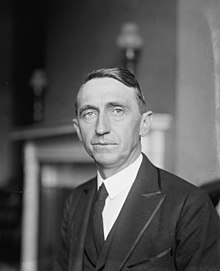Walter F. George
| Walter F. George | |
|---|---|

George in 1922
|
|
|
United States Senator from Georgia |
|
|
In office November 22, 1922 – January 3, 1957 |
|
| Preceded by | Rebecca L. Felton |
| Succeeded by | Herman E. Talmadge |
| President pro tempore of the United States Senate | |
|
In office January 5, 1955 – January 2, 1957 |
|
| Preceded by | Styles Bridges |
| Succeeded by | Carl Hayden |
| Personal details | |
| Born |
Walter Franklin George January 29, 1878 Preston, Georgia |
| Died | August 4, 1957 (aged 79) Vienna, Georgia |
| Nationality | American |
| Political party | Democratic |
| Spouse(s) | Lucy Heard George |
| Alma mater | Mercer University |
Walter Franklin George (January 29, 1878 – August 4, 1957) was an American politician from the state of Georgia. He was a long-time Democratic United States Senator and was President pro tempore of the Senate from 1955 to 1957.
George was born on a farm near Preston, Georgia, the son of Sarah (Stapleton) and Robert Theodoric George, who were sharecroppers. He attended public schools and then Mercer University in Macon, Georgia. He received his law degree from Mercer in 1901 and entered the practice of law. George served as a judge of the Georgia Court of Appeals in 1917 and as an Associate Justice of the Supreme Court of Georgia from 1917 to 1922.
George resigned from the Supreme Court of Georgia to run for a seat in the United States Senate, which became available due to the death of Thomas E. Watson. George won the special election but, rather than take his seat immediately when the Senate reconvened on November 21, 1922, George allowed the appointed Rebecca Latimer Felton to be sworn in, making her the first woman seated in the Senate, and serving until George took office on November 22, 1922, one day later. George was re-elected to his first full six-year term in 1926. He served in the Senate from 1923 until 1957, declining to run for a sixth full term in 1956. At that time, the Republican Party in Georgia was very weak, so the real re-election contests for George were in the Democratic primaries.
During the 1920s George, a Democrat, tended to vote much like his fellow senators from the South, conservatively. He supported prohibition and opposed civil rights for blacks, even voting against anti-lynching measures. He was a strong supporter of large corporations, particularly those based in Georgia, like the Coca-Cola Company and Georgia Power Company.
...
Wikipedia
